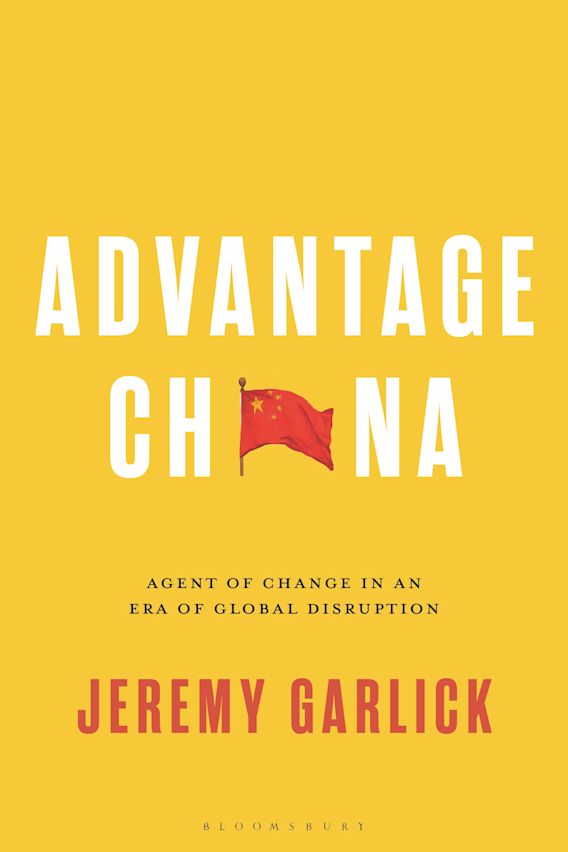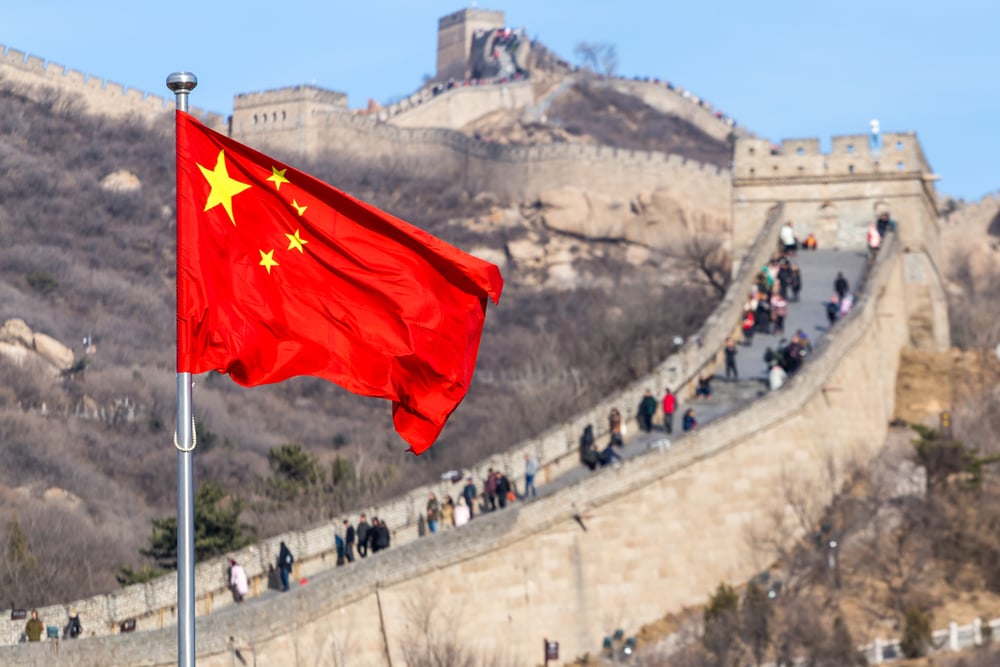China’s global power is growing, that is undeniable. The question is, what are the limits of that power, and how should other countries respond to that rise? Paul French talks to Advantage China author Jeremy Garlick to find out.
Associate Professor at Prague University of Economics and Business Jeremy Garlick examines China’s global policies, notably towards the global South, and its emerging financial and influential footprint worldwide in his new book Advantage China: Agent of Change in an Era of Global Disruption (Bloomsbury, 2023). What is the state of play with the seemingly troubled Belt and Road Initiative (BRI)? Can we unpack China’s multitude of new and ongoing ‘global’ initiatives? Can the Xi administration admit any policy weaknesses and re-tweak, or are they stuck in a fixed mindset? And, is this current property crisis going to be the property crisis, or will China once again deflate the debt bubble?
Paul French caught up with Jeremy Garlick to discuss these issues and more.
You suggest that the Belt and Road Initiative (BRI) has been a success for China. However, right now, it doesn’t seem to be going so well. What do you think? Is the BRI initiative over, or just stalled?
It’s true that BRI investments have slowed down since their peak in 2016-2017. Initially, this was the result of a deliberate decision by the Chinese government to rationalise spending so that money was not being wasted on vanity projects such as football clubs. Then came the pandemic, which obviously impacted China’s relations with the rest of the world. Now, China’s economic growth is slowing, and there is a housing crisis, so overseas investments have been shoved even further down the priority list.
However, one should realise that the BRI was never just about infrastructure investments. It was also an attempt at nation branding, aiming to boost China’s image and soft power across the Global South. An important part of this has been what the Chinese call ‘people-to-people exchanges’: offering training trips to China to groups of military officers, journalists and officials. Such junkets are a relatively inexpensive way for Beijing to influence elite groups in developing countries. There is plenty of evidence – some of which I outline in the book – that people-to-people exchanges are going on apace, mainly under the radar of the Western media and experts, and that they have given Beijing increased clout in many countries in the Global South.
In other words, the BRI is far from over. However, what we are now seeing may turn out to be a process of rebranding and recalibration of aims within the flexible envelope Beijing has created for its foreign policy vis-à-vis the Global South.

You note that the BRI was an extension, or a follow on, from China’s former Going Global initiative. Do you think that in the near future, we will see a new policy push adapting to current conditions both inside and outside China?
In fact, three new global initiatives were introduced last year: the Global Development Initiative, the Global Security Initiative, and the Global Civilisation Initiative. Essentially, although these remain rather unsubstantiated, they expand on the BRI by emphasising an aspect of Chinese foreign policy which was not explicitly included previously. The BRI came to be seen primarily as an infrastructure megaproject. Now, a decision seems to have been taken to focus on sustainable development goals, security issues, and China’s efforts to spread its vision of a “community of shared destiny” for the Global South. Interestingly, Beijing promotes its notion of ‘global civilisation’ as an alternative to the current international system. The West tends to believe that the present order promotes universal values, but Beijing perceives it – not unfairly – as being dominated by Western agendas.
Essentially, I would say all these past and present initiatives should be seen in the context of the Chinese government seeking to restore national pride by gradually taking on what it sees as its rightful role as a leader of the Global South. China aims to lead the formerly colonised developing world into a more active position in global affairs.
You mention that one of China’s strengths in the post-Mao period has been the ability to recognise failure and then reassess policies as necessary. This was certainly true under Deng. Do you think this ability to realistically reassess is possible under Xi?
Here, there is a bit of a question mark. Xi Jinping has entrenched himself in the corridors of power, extending his rule beyond the two terms that were previously the limit. Like most leaders who have clung tenaciously to power without limits, there is a danger that Xi will become over-confident in his ability and paranoid towards those who attempt to challenge his views. There are signs of this being the case. For instance, the recent sudden sidelining of the erstwhile foreign minister. If Xi becomes incapable of listening to the advice of his subordinates, or they become too afraid to criticise, there is a risk that policy will fossilise and China will be set on a fixed route under Xi from which there is no willingness to shift.
However, I believe there is also evidence that Xi has not yet reached the point of no return on this issue. For example, late last year, there was a sudden U-turn on zero-Covid policy as a result of public pressure. In the foreign arena, China seems to have changed its approach to Pakistan, resisting pressure to pour more money into a black hole of debt. Xi is educated in Chinese history and knows what happened to the Qing dynasty, which proved unable to adjust to the tide of history turning against it. He is surely aware of the need to be responsive to changing circumstances or risk being dethroned.
Property bubbles in China have been successfully deflated before. But the current levels of debt and issues in the housing market seem a step further than we’ve seen before. Do you think the property sector will be a major economically destabilising crisis in the near future?
The Chinese government has been seeking to deflate the property bubble for years. The current situation is the result of their efforts to reduce house prices and restructure the housing market by restricting construction companies’ access to finance. Obviously, this is no easy task. Even in 2010, when I was living in Beijing, house prices had become extraordinarily inflated and beyond the reach of many ordinary Chinese. This was a major problem for the Communist government, which has always sought to present itself as having the interests of the poor at heart.
In other words, the current problem is one that the government has not only anticipated but even facilitated. Yes, it is destabilising. However, I believe the government sees the current problems as an essential stage in restructuring the Chinese housing market and the overall economy. It believes the housing crisis is a necessary evil, a temporary forced downturn in China’s overall upward development trajectory. Economic turbulence has been overcome previously, and it can be overcome in this case too.
One of your clear messages is that we ‘need to learn the lessons of the Chinese approach to international development and change how we approach this subject.’ Can you expand a bit on how you think we can compete with China in the developing world, especially given both our strained finances and colonial history?
The most important lesson we need to learn from both China and our history is the need to respect the countries of the Global South – to treat them as equals rather than victims requiring pity and aid. Developing countries feel both patronised and neglected by the West. They also remember the colonial era keenly. What they want now is to be acknowledged as actors in their own right rather than ignorant and incapable of solving their own problems. Of course, they need financial assistance – some of which they obtain from China – but without having to listen to lectures on how to behave from Western countries.
At present, everybody’s finances are strained. China has problems, too, which is why it has been cutting back on BRI investments. Western countries are not poor and there is always a way to find some money if the will is there. Many countries do not actually want to take Chinese money but feel that they have no choice. The key is to provide some finance but on the basis of dealing with countries as equals rather than underlings, building mutual trust. A little more effort on the part of Western countries to show a deeper respect and understanding for the circumstances and traditions of developing countries would go a long way.
Realistically, can the UK still be a player in the Global South up against the ‘benefits’ China is offering right now? And if not, is there an alternative strategy we could pursue to compete globally?
I don’t see any way the UK can compete with China if it tries to act on its own. The UK needs to resume closer cooperation with Europe or the US (or both) if it is to achieve anything in the Global South. As a solo actor, the UK has to come to the realisation (finally) that the days of the Empire are long gone, and it is no longer able to influence world affairs in the top-down way it once did. In the UK’s position of diminished influence, close coordination and cooperation with other countries are essential.
One possible strategy for the UK to compete might be to engage with the Commonwealth countries as equals, working with them to construct a network of cooperation which could counter Chinese influence. If this strategy were employed, it would be essential to utilise a listening rather than lecturing approach, to take the time to understand the other nations’ needs.




